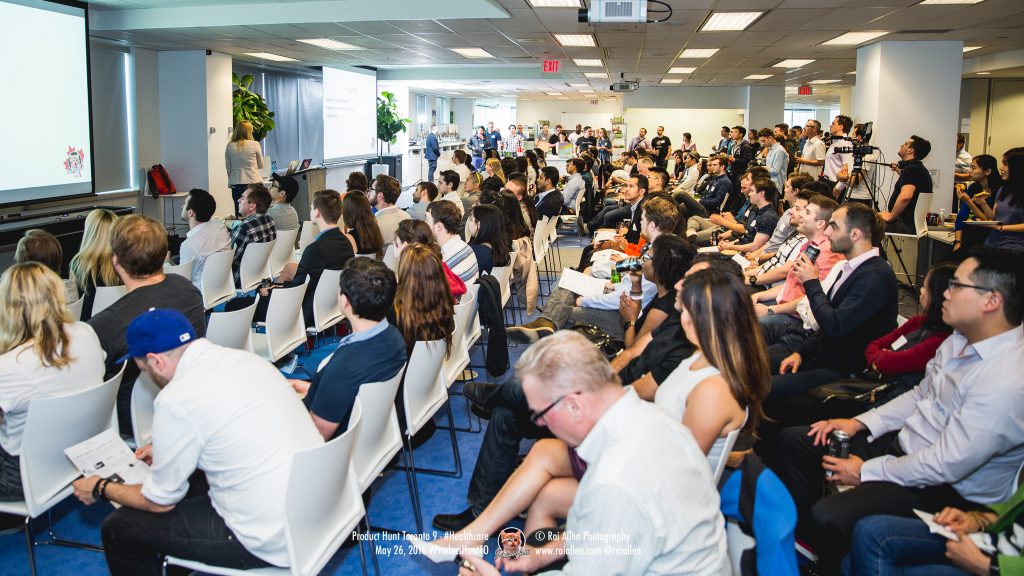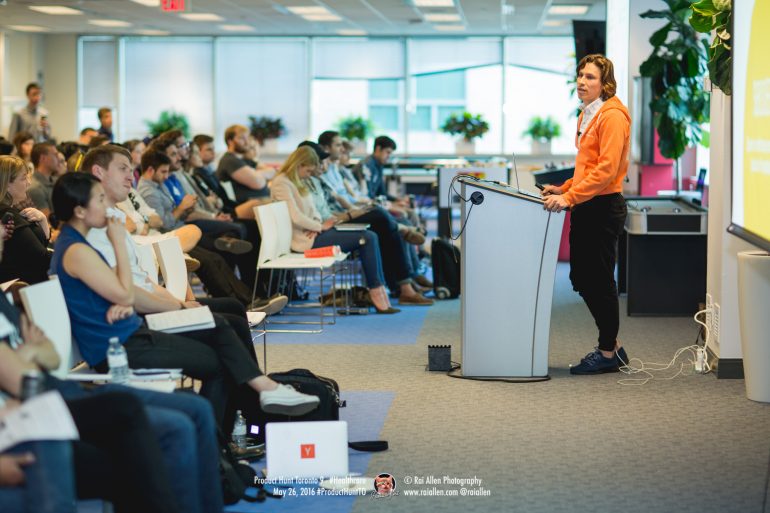Long wait times, confusion, and anxiety are often considered ubiquitous to the healthcare process. As Canada comes closer to facing the strain of an aging population on the healthcare system, and as that system struggles with prioritizing resources, at least one thing is obvious: bogged-down, bureaucratic healthcare delivery isn’t going to work.
Like most industries, agile startups in the healthcare space are quickly carving their niche where incumbents are slow to innovate. This month’s Product Hunt Toronto, with its special healthcare focus, put the spotlight on the startups that were doing exactly that — as well as what it took for them to get this far.
“When young companies get into the healthcare space, the first thing they think about is regulation. They’re like, we have to lawyer up,” said Opencare founder Nikolai Bratkovski, who kicked off the event. “They’re actually dead before they’re born. It comes back to prioritization, they prioritize resources and time in the completely wrong place so now they have all these great documents, but they have nothing to offer the customer.”

Bratkovski, who founded a SaaS company that served 2 million customers before founding doctor recommendations platform Opencare, shared the lessons he learned building healthcare products over the last 10 years that could apply to entrepreneurs working in any industry.
“We realized we should stop pushing something that’s more technical even if it’s cooler and could hold more features in the future, it doesn’t matter.”
“You can’t be everything to everyone, that’s what messes with entrepreneurs’ heads: ‘if we pull all nighters, we can build more features.’ But that’s not the way you do it,” said Bratkovski. “That’s an indicator that you’re gambling and you don’t know your customer you don’t know your business model, and that’s why you build as many features as possible because hopefully one of them will work. You should focus on building one thing really, really well.”
Meta, Akira, and Sage, the three startups showing live demos for the night, seemed to exemplify Bratkovski’s latter point: that startups should spend less time building bloated platforms, and more time becoming experts in one area. For all three of the startups, the biggest issue for their consumers was transparency and access to information. While Meta makes research papers more discoverable for scientists struggling to keep track of discoveries, both Sage and Akira allow their users to speak with the healthcare providers that they trust.
Dustin Walper, co-founder and CEO of Akira, launched its platform last week. Akira’s app provides users access to their doctor for diagnoses and opinions on common medical problems. The platform also gives the patient access to notes keeping track of everything their doctor has told them.
“With Akira, you actually get full access to every piece of information that your doctor has,” said Walper. “One of the biggest issues in healthcare is that people forget 40 percent of everything the doctor tells them. With Akira, you have access to every piece of info your doctor has, and you also have a history of past discussions with your doctor.”

Sage also provides full access to information in another way. The platform connects users to qualified senior home care in the GTA, and, using a chatbot through SMS, allows users to easily schedule appointments. The most distinguishing feature, though, is that Sage allows users to view a profile of the caregiver that will be taking care of their loved one — and includes information like education, experience, and a personalized video of the caregiver explaining who they are and why they chose to be a caregiver.
“I know exactly who’s coming, I know her certification, and my trust level has gone way up. If you go with a normal agency, you get none of this transparency,” said Vanessa Lee, co-founder of Sage.
In developing Sage, Lee learned the lesson that Bratkovski shared at the top of the event: that you really need to know your customer. Sage initially launched as a “funky” web platform, and to onboard customers, Lee and her co-founder personally greeted families and gave them their phone numbers. They found that those customers kept texting them to reschedule appointments rather than work through the platform. That discovery would eventually push Sage to pivot to text and chat bots as part of their scheduling platform.
“We realized we should stop pushing something that’s more technical even if it’s cooler and could hold more features in the future, it doesn’t matter. So we chose to simplify everything which I think goes along the theme of the talks we’ve seen today — just be diligent about what your users are saying,” Lee said. “We spent four weeks thinking that the text messages were so annoying when that was a huge clue as to what people wanted to use.”
Photos courtesy Brian de Rivera Simon @tarsipix


